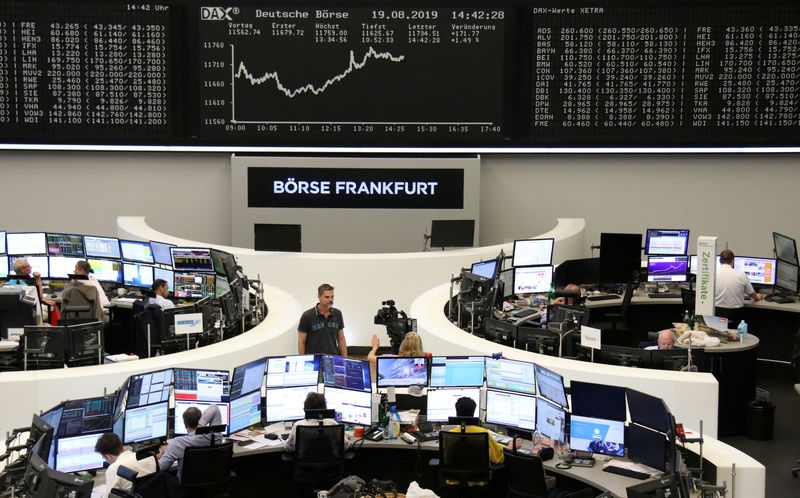By Tommy Wilkes
LONDON (Reuters) - European shares followed their Asian counterparts higher on Tuesday as investors bet possible monetary and fiscal stimulus measures would help stave off a major global economic downturn.
After a tumultuous first half of August as investors dumped equities and poured their money into government debt and other safe haven assets, some calm has returned to markets this week as traders welcomed talk of more stimulus in China and Germany.
In early European trade, the pan-region Euro Stoxx 600 rose 0.2%, the German DAX gained 0.1%, and Britain's FTSE rose 0.36%. That followed gains in Asia.
The MSCI world equity index, which tracks shares in 47 countries, rose 0.1% and followed a decent rebound on Monday.
Investors were cheered by signs policymakers were willing to do more to support their economies in the grip of international trade frictions, led by the bruising Sino-U.S. tariff tussle, and not everyone thinks the economy is in as bad shape as the market selloff last week implied.
"We still see limited near-term recession risks as central banks' dovish pivot helps stretch the economic cycle, yet caution that trade and geopolitical tensions pose downside risks," strategists at BlackRock (NYSE:BLK) Investment Institute said in their weekly research note.
China's new lending reference rate was set slightly lower on Tuesday after the central bank announced interest rate reforms designed to reduce corporate borrowing costs, while Germany's right-left coalition government has said it would be prepared to ditch its balanced budget rule and take on new debt to counter a possible recession.
The immediate focus now shifts to the minutes of the U.S. Federal Reserve's last meeting due on Wednesday. Traders are also keenly waiting on the Fed's Jackson Hole seminar and a Group of Seven summit this weekend for clues on what additional steps policymakers will take to bolster growth.
Senior White House officials are discussing a temporary payroll tax cut to boost the economy, the Washington Post reported on Monday.
SAFE HAVENS STEADY
Safe haven assets, which panicked investors had flocked to last week, saw their prices steady on Tuesday.
Bond yields rose marginally but remained below three-year highs touched last week. The 10-year German bund yield fell 2 basis points to -0.67%, above the record low of -0.727%.
The U.S. Treasury 10-year bond yield was 2 basis points lower at 1.582%, also above recent three-year lows.
Financial markets went into a tailspin last week after the Treasury yield curve briefly inverted when short-term yields traded above those of long-term paper - the inversion has presaged previous recessions and is widely watched by markets as a harbinger of a downturn.
Spot gold prices rose 0.4% to $1,501 after tumbling 1.2% on Monday, their biggest daily drop in about a month.
The Japanese yen, a popular currency for investors looking for safety, rose 0.2% to 106.41 yen per dollar but was well below the highs of 105.05 touched last week.
Elsewhere in currency markets the euro was little moved against the dollar at $1.1075 as traders prepare for the release of Fed minutes later in the week.
Investors will be watching the political situation in Italy, where Prime Minister Giuseppe Conte is set to address parliament on Tuesday afternoon (1300 GMT) to defend his record amid the growing chance of a snap general election.
Conte might hand in his resignation immediately afterwards or could instead wait for a formal vote to make it clear he is being unseated by the far-right League.
In energy markets, oil prices rose on the broader market optimism. Brent crude gained 0.13% to $59.82 a barrel, after climbing 1.88% on Monday. U.S. crude was up marginally at $56.25 a barrel, after rallying 2.44% in the previous session.
UNCONVENTIONAL POLICY
The key for markets now is whether pledges for more accommodative policy, either monetary or fiscal or a combination of the two, are enough to assuage concerns about the state of the global economy and end fears of recession.
In a sign of how far some central banks are willing to ease, Australia's central bank discussed unconventional monetary policies including negative interest rates at its August board meeting, according to minutes of the Reserve Bank of Australia's (RBA) Aug. 6 meeting.
Antoine Bouvet, senior rates strategist at ING, said the RBA minutes were the most important news of the day because of what they said about easing more generally.
"It spells out what the market is implicitly pricing: non-standard measures are difficult to withdraw," he said. "It is reasonable for rates markets to price those measures remaining a feature for a long time."

(This story has been refiled to fix garbled spelling of 'to', in paragraph 15).